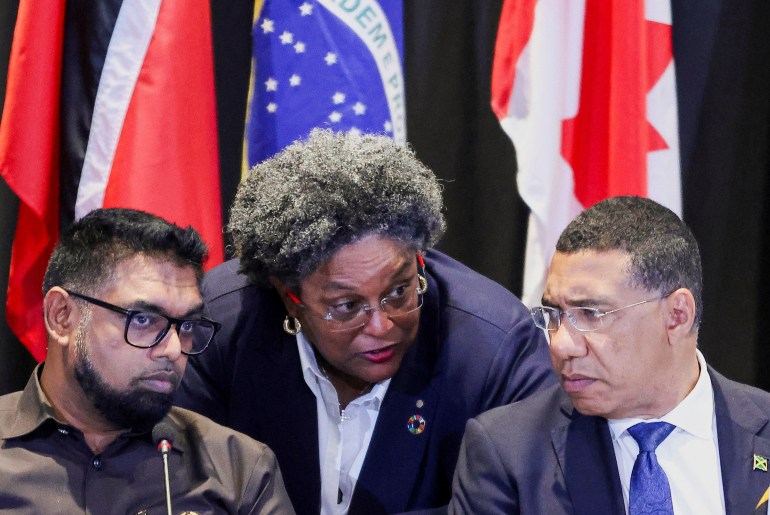Ariel Henry to step down after emergency regional summit as armed gangs sought to topple his government.
Haiti’s Prime Minister Ariel Henry has tendered his resignation, appealing for calm in the country amidst spiralling violence.
The 74-year-old, who led the country since the 2021 assassination of its last president, spoke on Monday in a video address, indicating he will step down once a transition council and interim prime minister have been appointed.
“The government that I am leading will resign immediately after the installation of (a transition) council,” he said. “I’m asking all Haitians to remain calm and do everything they can for peace and stability to come back as fast as possible.”
Henry is currently stranded in Puerto Rico after being prevented by armed gangs from returning home. A senior US official said he was free to remain there or travel elsewhere, though security in Haiti would need to improve for him to feel comfortable returning home.
The alliance of gangs, led by Jimmy “Barbecue” Cherizier, went on the rampage when Henry left the country in late February, seeking to rally support for a Kenya-led foreign police intervention that his government had argued was necessary to restore order so elections could be held.
They had warned of civil war if Henry, who became prime minister after President Jovenel Moise’s assassination in 2021, did not step down.
Regional leaders of the Caribbean Community (CARICOM) had held an emergency summit in nearby Jamaica on Monday to discuss the framework for a political transition, which the US had urged to be “expedited” as armed gangs wreaked chaos amid repeatedly postponed elections.
Henry, viewed as corrupt by many in Haiti, was not at the summit, which took place behind closed doors. The Associated Press said a spokesman for Henry’s office did not respond to calls seeking comment.

The prime minister was supposed to step down in February, and has been effectively locked out of the country since the unrest spiralled, landing in Puerto Rico last week after being denied entry into the Dominican Republic, which shares the island of Hispaniola with Haiti.
Mohamed Irfaan Ali, Guyana’s president and the current chair of CARICOM, said the emergency talks, which took place in Jamaica, were seeking to bring “stability and normalcy” to Haiti, the poorest country in the region.
United States Secretary of State Antony Blinken was also at the summit and promised an additional $100m for a United Nations-backed force to stabilise the country, as well as $30m in humanitarian assistance.
Blinken said the meeting was “critical” for Haiti and the region.
The US backed “a proposal developed in partnership with CARICOM and Haitian stakeholders to expedite a political transition through a creation of a broad based, independent presidential college”, the US State Department said in a statement.
The body would be comprised of two observers and seven voting members, including representatives from a number of coalitions, the private sector, civil society and one religious leader.
It would be tasked with meeting the “immediate needs” of Haitian people, enabling the security mission’s deployment and creating security conditions necessary for free elections, Blinken said.
A US official in Puerto Rico said Henry was free to remain in the US territory or to travel elsewhere, and that the prime minister had confirmed his resignation in a call with Blinken.


